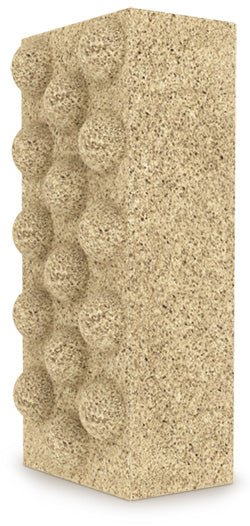Description
Brightwell Aquatics Xport BIO Brick
Ultra-porous Biological Brick Media with Superior Performance Characteristics
Overview
- Highest porosity and largest useable surface area, per unit weight or volume, of all filtration media available anywhere.
- Provides huge amounts of aerobic and anaerobic surface area for efficient bacterial colonization.
- Provides over 71,000 square feet (6,596 square meters) of surface area per liter of medium. One brick has about 100,000 square feet of useable surface area for bacterial colonization.
- When properly colonized, and used as directed, it will reduce toxic ammonia and nitrites to near zero in ponds and all aquariums, marine or fresh.
- Also reduces phosphate significantly and dissolved organics.
- Works excellently as the only filtration medium for the aquarium or pond or may be employed in addition to other filtration media.
- Doped with Aragonite to buffer pH at the bacteria level, preventing acid buildup which eventually would kill the bacteria and reduce capacity. (Which is what happens in competing products)
Size
9" x 4.5" x 2.5"
Instructions - Guidelines
Use one XPort Bio Brick for every 1,000 U.S. gallons ( 3,800 L ) of system capacity, more for heavy bio loads. Rinse material well with aquarium water or purified tap water. For superior results, seed the material using FlorinBacter, MicrōBacter7 or MicrōBacterCLEAN, as appropriate for your aquarium, by placing XPort Bio Brick in a plastic container, filling it with aquarium water, and then adding the full recommended dose of either bacterial product, based on the size of your aquarium, to that container. Allow to stand overnight and then add the seeded XPort Bio Brick to your system. You may also add the water back to your aquarium, if desired. It is recommended that you use sponge, fine filter floss or other mechanical filtration ahead of XPort Bio Brick to prevent clogging with organic material. For maximum results, also provide a good carbon source for growing bacteria, such as Brightwell Katalyst bio pellets or liquid Reef BioFuel or Florin Axis, as appropriate for your aquarium, as directed on their label.
Additional information
You can use more bricks than the capacity shown above. You can't have too much filtration, the bacterial growth will be self limiting. It is prudent to use a whole brick even in smaller systems down to about 50 U.S. gallons. If the system is smaller than that, then use the cubes instead. For nitrification, or removal of ammonia and nitrite, employing the brick aerobically, or above the water line will provide maximum results. To do this, mount the brick in air, above the water level, and run a small stream of water through the brick. It is not necessary or desirable to run the whole flow of the main system pump through the brick. A flow of about 40 to 80 liters per hour is ideal. An adjustable flow control will allow you to adjust the water flow to only that which will flow through (and not around) the brick. On the other hand, removing nitrate is an anaerobic process and limiting oxygen to the brick as much as possible will maximize the nitrate removal. In this case, mount the brick beneath the water surface in the sump in a very low flow area, if possible.
To use one brick for both aerobic nitrification and anaerobic denitrification, mount the brick below the water surface and provide medium flow around it. The bacteria growing in the top 1/4" of the surface of the brick will be aerobic and will use up all the oxygen so that the inside of the brick goes anoxic or anaerobic. Anaerobic denitrifying bacteria will then colonize the internal surfaces of the brick and you will get both nitrification on the surface and denitrification in the internal parts.
While the BIO Brick will perform both nitrification and denitrification, if your need is primarily for denitrification, you should purchase the NO3 Brick instead or in addition.
One important criteria in marine systems is gas exchange. Xport is the best bacterial media in the world, but it is not good at gas exchange. Bio balls are the best for gas exchange, so any system will work better with a small stack of bio balls placed in the main flow (in air).
Shipping was quick and arrived intact. We will see how it performs.

